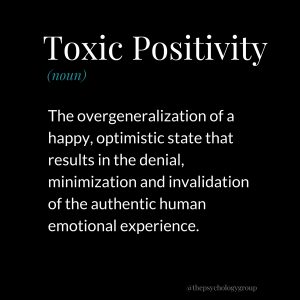It is almost impossible to go on Facebook or Instagram without seeing quotes or comments accompanied with motivational words such as, “Look on the bright side,” “Focus on the good things,” or “Be positive.”
If anything, the pandemic has exacerbated the phenomenon of “toxic positivity.” “It’s going to be OK,” is undoubtedly one of the best-known examples of this.
Though well-intentioned, these phrases can end up creating more distress instead of helping. Why? Because they are examples of toxic positivity, a school of thought that operates on the principle that one should always have a positive attitude, even when things get difficult.
What is toxic positivity?
We define toxic positivity as the excessive and ineffective overgeneralization of a happy, optimistic state across all situations. The process of toxic positivity results in the denial, minimization, and invalidation of the authentic human emotional experience.
Just like anything done in excess, when positivity is used to cover up or silence the human experience, it becomes toxic. By disallowing the existence of certain feelings, we fall into a state of denial and repressed emotions. The truth is, humans are flawed. We get jealous, angry, resentful, and greedy. Sometimes life can just flat out suck. By pretending that we are “positive vibes all day,” we deny the validity of a genuine human experience.

Signs of Toxic Positivity
- Hiding/Masking your true feelings
- Trying to “just get on with it” by stuffing/dismissing an emotion(s)
- Feeling guilty for feeling what you feel
- Minimizing other people’s experiences with “feel good” quotes or statements
- Trying to give someone perspective (e.g., “it could be worse”) instead of validating their emotional experience
- Shaming or chastising others for expressing frustration or anything other than positivity
- Brushing off things that are bothering you with an “It is what it is”
Why It’s Harmful
Toxic positivity can actually harm people who are going through difficult times. Rather than being able to share genuine human emotions and gain unconditional support, people find their feelings dismissed, ignored, or outright invalidated.
- It’s shaming: When someone is suffering, they need to know that their emotions are valid, but that they can find relief and love in their friends and family. Toxic positivity tells people that the emotions they are feeling are unacceptable.
- It causes guilt: It sends a message that if you aren’t finding a way to feel positive, even in the face of tragedy, that you are doing something wrong.
- It avoids authentic human emotion: Toxic positivity functions as an avoidance mechanism. When other people engage in this type of behaviour, it allows them to sidestep emotional situations that might make them feel uncomfortable
- It prevents growth: It allows us to avoid feeling things that might be painful, but it also denies us the ability to face challenging feelings that can ultimately lead to growth and deeper insight.
- The “positive vibes only” mantra can be particularly grating during times of intense personal distress. When people are coping with situations such as financial troubles, job loss, illness, or the loss of a loved one, being told that they need to look on the bright side can seem downright cruel.
- It is possible to be optimistic in the face of difficult experiences and challenges. But people going through trauma don’t need to be told to stay positive or feel that they are being judged for not maintaining a sunny outlook.
So, how do you deal with toxic positivity?
1. Avoid ignoring or stuffing your emotions: Acknowledge how you feel, and feel all your emotions, good or bad. Sit with them. Avoiding how you feel will only prolong the discomfort. In fact, it’s good to talk (or write) about how you feel. Putting feelings into words reduce the intensity of emotions such as sadness, anger, and pain.
2. Listen and validate how others feel — even when it’s different than how you feel. Everyone’s entitled to their own feelings. Don’t shame another person for their emotions. It’s really important to acknowledge that others may not cope with things the same way you do.
3. Remember, it’s OK not to be OK: “If you’re overwhelmed and exhausted, give yourself permission to rest or do something imperfectly, free of guilt,” Long says.

4. Remember that feelings aren’t mutually exclusive: Healthy positivity acknowledges authentic emotions, It rejects the either/or mindset and holds that two opposing concepts can be true simultaneously. In other words, you can be sad about losing your job during the pandemic and be hopeful about finding a new job in the future.
5. Be realistic: If you want to feel productive, start with small, actionable steps. During times of emotional distress, do not engage in brand-new tasks that you think will make you feel better. Rather, expand on things you are already good at and familiar with. Stick with what you know until you feel better.
6. Recognize toxic positivity messages: Usually, these messages are overly simple: “Positive vibes only,” “Choose happiness,” etc. Remember, what makes positivity toxic is that it dismisses other genuine emotions.
7. It’s OK to be wary of social media: People put their best-filtered foot forward on social media. Rarely do people post their faults, flaws, or highlight their poor decision making. As a result, social media gives off the impression that everyone is handling hard times ‘better than you,’ [and] this fosters a sense of loneliness, shame, and embarrassment.

Give yourself permission to feel your feelings. Instead of trying to avoid difficult emotions, give yourself permission to feel them. These feelings are real, valid, and important. Sometimes it is important to sit with your feelings and give yourself the time and space to process the situation before you take action. So when you are going through something hard, think about ways to give voice to your emotions in a way that is productive. Write in a journal. Talk to a friend. Research suggests that just putting what you are feeling into words can help lower the intensity of those negative feelings.
Call/WhatsApp Ms Seema Agarwal: +91 98205 76682

